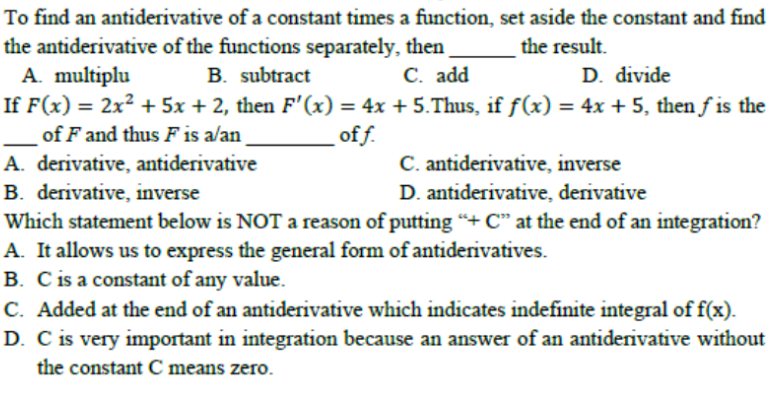To find an antiderivative of a constant times a function, set aside the constant and find the antiderivative of the functions separately, then A. multiplu If F(x) = 2x² + 5x + 2, then F'(x) = 4x + 5.Thus, if f(x) = 4x + 5, then f is the of F and thus F is a/an the result. B. subtract C. add D. divide off. C. antiderivative, inverse D. antiderivative, derivative A. derivative, antiderivative B. derivative, inverse Which statement below is NOT a reason of putting "+ C" at the end of an integration? A. It allows us to express the general form of antiderivatives. B. C is a constant of any value. C. Added at the end of an antiderivative which indicates indefinite integral of f(x). D. C is very important in integration because an answer of an antiderivative without the constant C means zero.
To find an antiderivative of a constant times a function, set aside the constant and find the antiderivative of the functions separately, then A. multiplu If F(x) = 2x² + 5x + 2, then F'(x) = 4x + 5.Thus, if f(x) = 4x + 5, then f is the of F and thus F is a/an the result. B. subtract C. add D. divide off. C. antiderivative, inverse D. antiderivative, derivative A. derivative, antiderivative B. derivative, inverse Which statement below is NOT a reason of putting "+ C" at the end of an integration? A. It allows us to express the general form of antiderivatives. B. C is a constant of any value. C. Added at the end of an antiderivative which indicates indefinite integral of f(x). D. C is very important in integration because an answer of an antiderivative without the constant C means zero.
Functions and Change: A Modeling Approach to College Algebra (MindTap Course List)
6th Edition
ISBN:9781337111348
Author:Bruce Crauder, Benny Evans, Alan Noell
Publisher:Bruce Crauder, Benny Evans, Alan Noell
ChapterA: Appendix
SectionA.2: Geometric Constructions
Problem 10P: A soda can has a volume of 25 cubic inches. Let x denote its radius and h its height, both in...
Related questions
Question
Choose the correct answers given below.

Transcribed Image Text:To find an antiderivative of a constant times a function, set aside the constant and find
the antiderivative of the functions separately, then
A. multiplu
If F(x) = 2x² + 5x + 2, then F'(x) = 4x + 5.Thus, if f(x) = 4x + 5, then f is the
of F and thus F is a/an
the result.
B. subtract
C. add
D. divide
off.
C. antiderivative, inverse
D. antiderivative, derivative
A. derivative, antiderivative
B. derivative, inverse
Which statement below is NOT a reason of putting "+ C" at the end of an integration?
A. It allows us to express the general form of antiderivatives.
B. C is a constant of any value.
C. Added at the end of an antiderivative which indicates indefinite integral of f(x).
D. C is very important in integration because an answer of an antiderivative without
the constant C means zero.
Expert Solution
This question has been solved!
Explore an expertly crafted, step-by-step solution for a thorough understanding of key concepts.
This is a popular solution!
Trending now
This is a popular solution!
Step by step
Solved in 2 steps with 2 images

Recommended textbooks for you

Functions and Change: A Modeling Approach to Coll…
Algebra
ISBN:
9781337111348
Author:
Bruce Crauder, Benny Evans, Alan Noell
Publisher:
Cengage Learning

College Algebra (MindTap Course List)
Algebra
ISBN:
9781305652231
Author:
R. David Gustafson, Jeff Hughes
Publisher:
Cengage Learning

Functions and Change: A Modeling Approach to Coll…
Algebra
ISBN:
9781337111348
Author:
Bruce Crauder, Benny Evans, Alan Noell
Publisher:
Cengage Learning

College Algebra (MindTap Course List)
Algebra
ISBN:
9781305652231
Author:
R. David Gustafson, Jeff Hughes
Publisher:
Cengage Learning